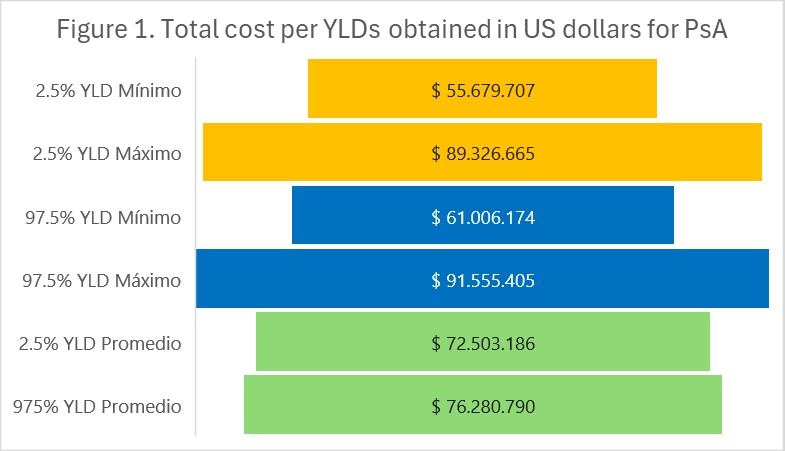Session Information
Session Type: Poster Session C
Session Time: 10:30AM-12:30PM
Background/Purpose: Psoriatic arthritis (PsA) is a high-cost disease due to its significant impact on patients’ quality of life and the extensive resources required for its treatment. This study aims to quantify the economic burden associated with PsA in Colombia, analyzing direct costs and developing a model for economic burden quantification to provide a comprehensive understanding of its impact on healthcare system and society
Methods: A multidimensional approach was performed, integrating various data sources and analytical techniques to provide a thorough assessment of the economic impact of PsA. Data collection involved a systematic review of relevant scientific articles. These articles discussed quality of life measures, epidemiological outcomes, and economic burden related to PsA.
Using collected data, a model was constructed to estimate the direct costs. Incident PsA population data were derived from the MIPRES database, which is a technological tool implemented by the National Ministry of Health (NMH) to report prescriptions and health technologies not included in the benefits plan. Years lived with disability (YLD) were calculated based on population projections, WHO methodologies and methodological guidelines from the NMH.
Direct costs (pharmacological treatment expenses) were calculated using the price per minimum unit of concentration (PUMC) for medications. Indirect costs were estimated based on productivity loss, using average income data from DANE and frequency of medical consultations. Validation of calculations involved statistical techniques, including Monte Carlo simulations, to ensure robustness and reliability. A sensitivity analysis was conducted to assess the impact of variations in key assumptions and parameters on the study results. This included scenarios with different prevalence rates of PsA, treatment costs, discount rates, treatment adherence levels, and the potential impact of new technologies. Monte Carlo simulations provided probability distributions for estimated costs and highlighted critical factors influencing the economic burden of PsA. The databases were analyzed for the year 2021 and cost are presented in US dollars
Results: The total pharmaceutical cost for YLDs obtained, ranged between $56.614 and $91.084, with a mean of $73.864. The non-pharmaceutical cost linked to consultations by YLDs obtained, ranged between $417 and $527, with a mean of $472. Figure 1. Interestingly, the cost stratified by gender for female population increased up to $99.165 and for male population up to $102.865. Additionally, the cost for YLD obtained and stratified by age in women ≤44 years was $77.704 and for those women ≥44 years was $93.244. In the case of males, the cost for YLD obtained by age in the group ≤44 years was $76.964, in comparison to those ≥44 years which was $98.425
Conclusion: This study revealed a significant direct cost associated with PsA at country level in relation to gender and age, offering valuable insights for policymakers and healthcare providers to improve disease management and reduce the overall economic impact. This data highlights the need for strategic healthcare interventions and efficient resource management to address PsA in Colombia
To cite this abstract in AMA style:
Bautista-Molano W, Ramirez-bolivar I, Pinilla-Forero C, Ruiz L. Evaluation of the Economic Burden of Psoriatic Arthritis: Assessment of Direct Costs Using National Administrative Databases at National Level [abstract]. Arthritis Rheumatol. 2024; 76 (suppl 9). https://acrabstracts.org/abstract/evaluation-of-the-economic-burden-of-psoriatic-arthritis-assessment-of-direct-costs-using-national-administrative-databases-at-national-level/. Accessed .« Back to ACR Convergence 2024
ACR Meeting Abstracts - https://acrabstracts.org/abstract/evaluation-of-the-economic-burden-of-psoriatic-arthritis-assessment-of-direct-costs-using-national-administrative-databases-at-national-level/

